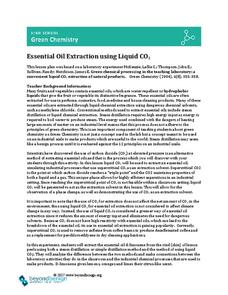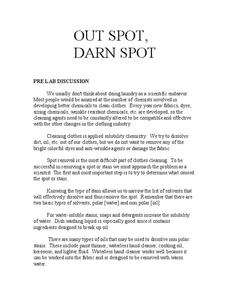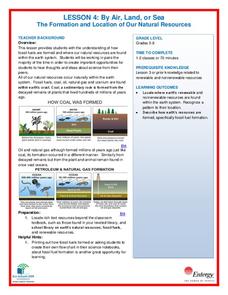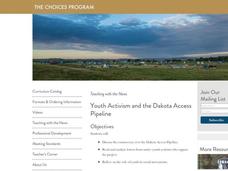Beyond Benign
Essential Oil Extraction Using Liquid CO2
When life hands you lemons ... experiment on them! Green chemistry gurus compare extraction methods for essential oils through a lab activity. Lab groups use traditional distillation and liquid carbon dioxide extraction methods, then...
Curated OER
Fossil Fuels (Part III), The Geology of Coal
Do not overlook this set of lessons just because your school does not have a data analysis system. There is plenty of material here to administer a complete mini unit on the formation, distribution, and properties of coal. Since it...
Curated OER
Fossil Fuels (Part I), The Geology of Oil
Junior geologists work through three mini-lessons that familiarize them with the formation and location of fossil fuels. Part one involves reading about petroleum and where it comes from via a thorough set of handouts. A lab activity...
Curated OER
Oil Crisis: What Would You Do?
The dynamics between the economies and politics of the United States and the Middle East are here to study. Upper graders read and discuss scenarios relating to OPEC and the current oil crisis, then in small groups role-play members of...
Curated OER
How to Clean Up an Oil Slick
Young scholars explore how an oil spill is contained and cleaned up. They investigate an oil absorbing polymer that is hydrophobic, absorbs up to 19 times its own weight in nonpolar liquids, floats on water, and can be reused or disposed...
Radford University
At the Gas Pump
Given the price of crude oil, gasoline, and diesel for the past several years, pupils plot the data to determine whether a correlation exists. Learners determine a regression line and predict the price of gasoline and diesel in the...
National Wildlife Federation
Fossil Fuel Extraction Activity
Extracting oil is more difficult than many think! Learners work together and get hands-on as they represent oil companies drilling for oil by simulating oil extraction using beans. They identify the challenges faced in using...
College Board
2004 AP® Microeconomics Free-Response Questions
All goods have a social cost. A set of questions considers how to best calculate the impact the production of goods has on society. Other practice problems from College Board consider supply-and-demand curves and the impact of licensing...
College Board
2008 AP® Environmental Science Free-Response Questions
Some of the oiliest creatures on earth may be the answer to our energy crisis! Using a four-question assessment, resource scholars consider the use of microalgae as fuel among other environmental science topics. Each question has several...
Magic of Physics
Franklin's Lab
Get energized! Circuitry scholars follow the path of energy from its beginnings as a fossil fuel all the way to bulbs and batteries using an interesting interactive. Groups or individuals help Ben Franklin discover how to convert and...
Serendip
Out Spot, Darn Spot
Encourage your classes to be laundry helpers! Learners explore the chemistry of stain removal with a lab investigation. By identifying the components of the stain, they identify the most effective solute for its removal.
Royal Society of Chemistry
Crude Oil
The United States consumes more oil than any other country, and its residents use 50 percent of that for transportation. Scholars match eight fractions of crude oil to their applications. Then, they fill in three logic puzzles reviewing...
Concord Consortium
Oil and Water
If you don't get along with someone, it's said that the two of you are like oil and water. Why is this? Explore the phenomenon and explain the phrase in one resource! Science superstars first observe samples of oil and water together....
Concord Consortium
Molecular Sorting
Can scientists sort molecules based on their interaction with oil and water? The simulation demonstrates how this is possible. Pupils decide when to insert a molecule and observe how they sort themselves based on polarity.
Concord Consortium
Micelles
Micelles consist of an aggregate of molecules in a colloidal solution. The simulation presents two different ways the molecules assemble into micelles based on the polarity of the solution in which they are placed. Scholars can set the...
Concord Consortium
Polar and Non-Polar Interface
Why is there so much frozen water at Earth's poles? Because water is a polar molecule! Young scientists observe polar molecules moving in a mixture of oil and water. They see the changes in potential energy in the hydrophilic and...
National Wildlife Federation
By Air, Land, or Sea: The Formation and Location of Our Natural Resources
Coal forms from the ancient remains of plants that were alive on Earth before the dinosaurs! Scholars use their t-charts from the previous lesson over resources and research to determine if their information is correct. Through analysis...
Balanced Assessment
Oil Consumption
An assessment presents a chart displaying oil consumption Pupils use the chart to determine the greatest increase in consumption, and then apply that information to figure out when the consumption may reach 100 million barrels a day.
NOAA
Biological Oceanographic Investigations – Signals from the Deep
The Deepwater Horizon oil spill directly impacted an area of the Gulf of Mexico the size of Oklahoma. A marine biology lesson plan looks at the impact of an oil spill on the deeper parts of the ocean. Scholars download actual data...
Brown University
Youth Activism and the Dakota Access Pipeline
Do young people have a role in social movements? Should they? The involvement of young people in the Dakota Access Pipeline is the focus of a resource that asks class members to examine letters written by native youths who oppose the...
Teach Engineering
Density Column Lab - Part 2
Groups suspend objects within layers of liquids to determine the densities of different liquids and compare them to the densities of objects calculated in Part 1. The groups then carefully test their calculations by layering the liquids...
Teach Engineering
Density and Miscibility
The liquids did not mix — so what do density columns have to do with it? The seventh part in a series of nine provides the theoretical explanation of why density columns do not mix. The lesson covers the topics related to mixing and...
Curated OER
Fracking: Positive or Negative Impact?
Your teenagers may have heard of fracking, but do they really know what it is? And could they debate the benefits and risks? Educate your environmental science class with a lesson about hydraulic fracturing, non-renewable energy sources,...
It's About Time
Oil and Gas Production
Would you consider a power failure a current event? This lesson uses multiple experiments, guided inquiry activities, and group discussions to cover the topics of oil and gas production. This is the seventh lesson in a series of eight.

























